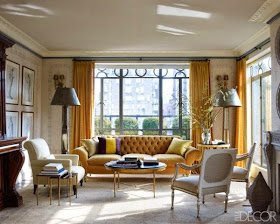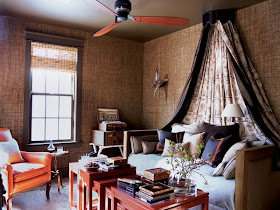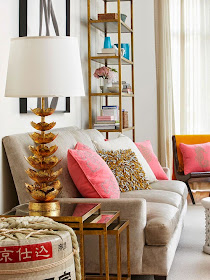Originally called the quartetto table, nesting tables have been widely used for generations. English designer Thomas Sheraton popularized the four piece stacking set two centuries ago.
Three-in-one nesting side tables are pretty, yet functional accent pieces that can be displayed together or arranged separately as needed so they definitely earn points for practicality. Furniture that serves a dual purpose is ideal for today’s lifestyles and interiors. Created with mobility and flexibility in mind, nesting tables can be organized in an unlimited variety of stylish and functional configurations. Use nesting tables separately or grouped together as end tables, coffee tables or display tables for plants or other decorative pieces.
With all of the many styles of nesting tables available, you can easily find sets that fit your budget and your home's decor. Once you are the proud owner of a set of nesting tables you will quickly understand why they are such a popular choice of accent furniture.
I can remember a time when it seemed like all nesting tables looked like this. Everyone had their set of Florentine tables.
Today there are so many different styles of nesting tables to choose from, made from different types of materials including glass, leather, bamboo, steel, or acrylic.
Their current popularity has resulted in the creation of an extensive variety of table designs.
Perfect for showcasing collectibles or displaying books, nesting tables work great in smaller spaces. These are particularly lovely!.
Jean Louis Deniot
With small homes is necessary to add furniture pieces that do double duty, or that can be moved out of the way and hidden quickly and easily. Nesting side tables are a great option.
via pinterest
Use a set of nesting tables to create an impromptu coffee table scaled to suit almost any place in your home.
Alexandra Rae Interiors
Because they slide under one another for easy storage, nesting tables stand the test of time because they are are practicable.
Since brass has made its comeback, a set of nesting tables like this is a current addition to this bedroom.
These zebra painted nesting tables would add an elegant touch of the exotic to any interior.
Kate Monckton
There are nesting tables for every style. The wooden set and quilt compliment a country/rustic decor.
Finished with a glossy lacquer, the modern shape of these tables add sophistication and flair to any style of room.
This set of nesting tables is just my style. By Hooker Furniture
Ans as you can see the Florentine nesting tables are still sought after.
Decorating on a budget doesn't always allow for brand new furniture. However a set of nesting tables will liven up your interior without breaking the bank.
I would love these nesting tables. So old world in design, they are perfect with this lit a la polonaise.
Nesting tables are an ideal way to gain extra space in the bathroom when you’re getting dressed or applying make-up. They are an ideal place to put the clothes and towel you’ll be needing after a bath or shower.
These industrial style nesting tables are the perfect accent pieces for this modern sitting room.
The sleek minimalist lines of this set of nesting tables are interpreted as a little more glamorous with a metallic finish of stylish silver leaf.
Nesting tables shouldn't be used only in the living room, lounge or family room. You can include this kind of tables in a guest room, bath or other spare room.
source unknown
Created with mobility and flexibility in mind, nesting tables can be organized in an unlimited variety of stylish and functional configurations.
via pinterest
Because they are available in so many materials you will easily find a style to match your home design.
Click here to see the previous post
http://www.eyefordesignlfd.blogspot.com/2014/06/decorating-with-paisley.html
Click here to see the previous post
http://www.eyefordesignlfd.blogspot.com/2014/06/decorating-with-paisley.html
This blog post was published by Lisa Farmer


.jpeg)


.JPG)






.jpg)







.jpg)
.jpg)



.jpg)



